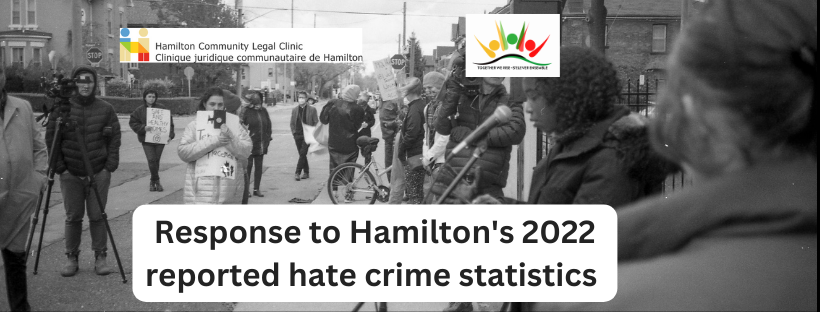
In 2022, the city of Hamilton saw a 61% increase in reported hate crimes, of which the Black community is a targeted group, among other communities. In previous years, Hamilton had the highest number of hate crime reports in Canada and was deemed by the media as the hate crime capital of Canada. Hamilton has a lot of work to do.
This information comes as no surprise to Black community members and to all those on the frontlines of advocating against the harm and racism that our communities experience. It is important to note that this statistic only minimally represents the experiences of Black community members, as many often do not report incidents to police or authorities due to a lack of safety or willingness to subject themselves to a process of hate reporting.
It is without question that life as a Black person in Hamilton is difficult to support. Through the advisory committee of the Black Justice Program at the Hamilton Community Legal Clinic known as Together We Rise/Selever Ensemble, we know Black community members face higher rates of income insecurity, housing insecurity, poverty, criminalization and harm. Currently, Black tenants are overwhelmed with high rents, lack of maintenance and unsafe living conditions in the downtown core. Students are experiencing structural racism in schooling systems. Black community members are subject to higher incidents of low-income and/or precarious employment. Black community members experience medical racism and are often subjected to hate in the public arena as political candidates. Increasingly, Black community members are experiencing violence in all sectors of public and private life. Hate trends often do not reflect this reality of systemic and institutional anti-Black racism. All of this is important in acknowledging these trends as a part of a larger structure of anti-Blackness, what it looks like and how it comes about in every facet of Black life.
In addition to raising awareness of anti-Black racism, we all must collectively and holistically build capacity amongst the Black community and address these systems of anti-Blackness and oppression.
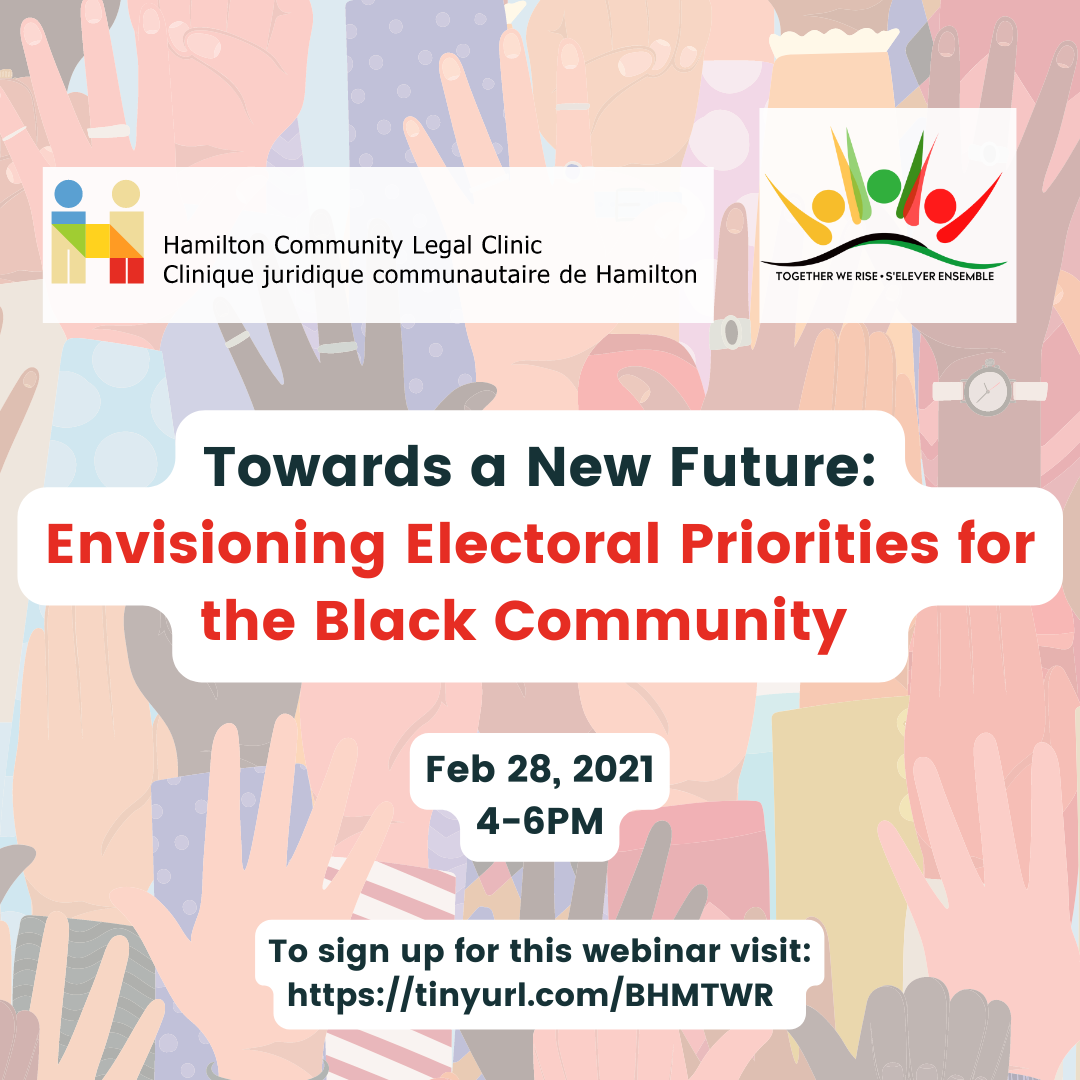
Join us on Feb 28th at 4pm for a panel discussion on the upcoming provincial and municipal elections. This is an opportunity to start envisioning electoral priorities for the Black community in Ontario and to connect issues of housing, policing, healthcare, etc to anti-Blackness.
To register for this event : https://us06web.zoom.us/webinar/register/WN_r3o6jsFySQKFLIftnv9x3g

Despite human rights being protected by federal, provincial and territorial laws, racist and discriminatory stereotypes about people of African Descent permeate contemporary society and disproportionally impact the social, economic, educational, and health outcomes of Black men, women and children. Whether they are descendants of those who were enslaved or recent immigrants, people of African Descent are united by a shared, lived experience with anti-Black racism. It is within this tension that the Hamilton Community Legal Clinic launched Together We Rise!
The Together We Rise advisory committee is made up of a maximum of 12 Black community members. The advisory committee actively participates in directing and creating events, facilitates long term visioning and meets regularly. The advisory committee works with the Black Justice Coordinator to realize a more just and equitable environment for Black Hamiltonians. We encourage youth (ages 15-29), self-identified Black elders (age 55 and up) and all Black community members from different walks of life to join this committee.
To read more about Together We Rise: https://hamiltonjustice.ca/en/community-justice/black-justice/
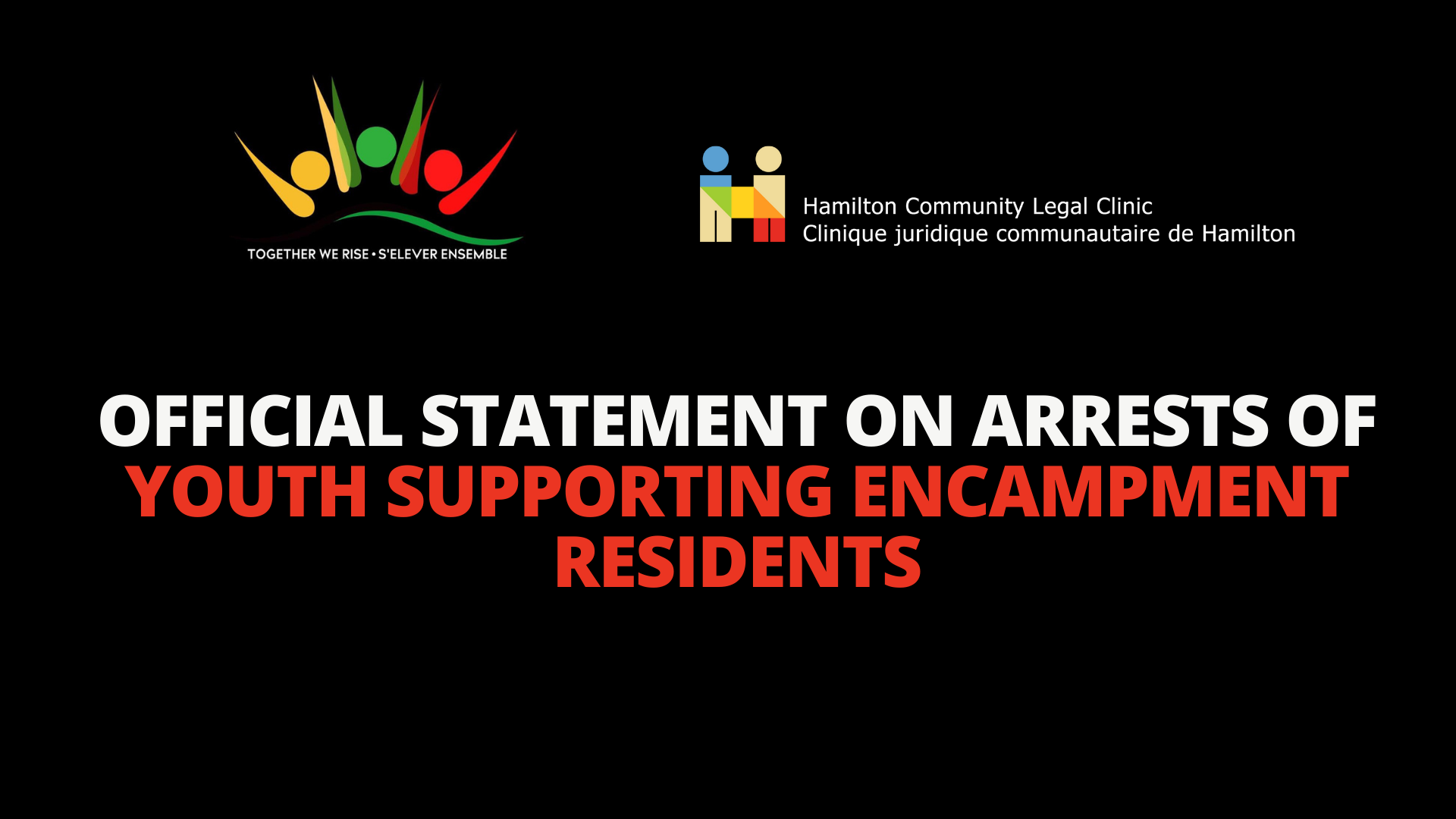

Together We Rise is an initiative of the Hamilton Community Legal Clinic to combat individual and systemic Anti-Black racism by providing a range of clinic law services and collaborating with Black-serving community organizations and agencies to build relationships and trust. We use an anti-racism, anti-oppression lens and seek to foster systemic change by identifying harmful structures, policies and actions, and advocating for more inclusive and equitable practices across our community.
Hamilton is experiencing a housing crisis. The city is one of the most unaffordable places to live in North America, tenants are facing renovictions and shelter spaces are at a premium. Many people experiencing poverty have been forced to seek shelter in tents in neighbourhood parks and on public lands. A disproportionate number of these residents are Indigenous, Black and racialized.
On November 24th and 26th six community advocates were arrested at a park encampment and in front of the downtown police station. Five of those arrested were Black youth. All six were regularly engaging in community work, providing food, supports and assistance to encampment residents.
Individuals sustained severe injuries during their arrests, including punches to the face, concussions, being choked, a knee pin to the neck and possible fractures. Severe conditions were also imposed on all six, which bans them from all encampments and city parks, preventing them from participating in community work.
As a society we have acknowledged that anti-Blackness is embedded in all of our systems and structures, including our large institutions like the police and municipal government. It is important that we understand these arrests in this context and collectively frame excessive use of force as a manifestation of anti-Blackness. An officer on the scene was photographed with a thin blue line patch on his uniform, what has become a symbol of white supremacy and far right groups opposing the Black Lives Matter movement. These incidents occurred within 48 hours of Hamilton Police Service’s “Rebuilding trust with the Black community session”, where relationship building were discussed and promoted.
Peaceful protest is a hallmark of a free and democratic society. It must not be criminalized. We urge the City of Hamilton and Hamilton Police Services to apply the “equity, diversity and inclusion” lens they espouse, to understand their role in perpetuating anti-Blackness regarding encampment evictions and peaceful protest. These arrests and the criminalization of Black youth are an issue of anti-Blackness. We are alarmed by the harm, trauma and anti-Blackness experienced by these Black youth, and are concerned for their wellness, livelihood and futures stemming from this excessive criminalization.
We stand in solidarity with those in our community exercising their right to peaceful protest in support of those in encampments.
We stand in solidarity with leaders in the Black community and endorse their calls for the charges to be dropped, a judicial inquiry of the incidents and an end to encampment evictions outside of the negotiated protocol.
Together We Rise
Black Justice Initiative – Hamilton Community Legal Clinic

We are pleased to present the community HCLC’S 2021 Annual Report. Please see the link below!
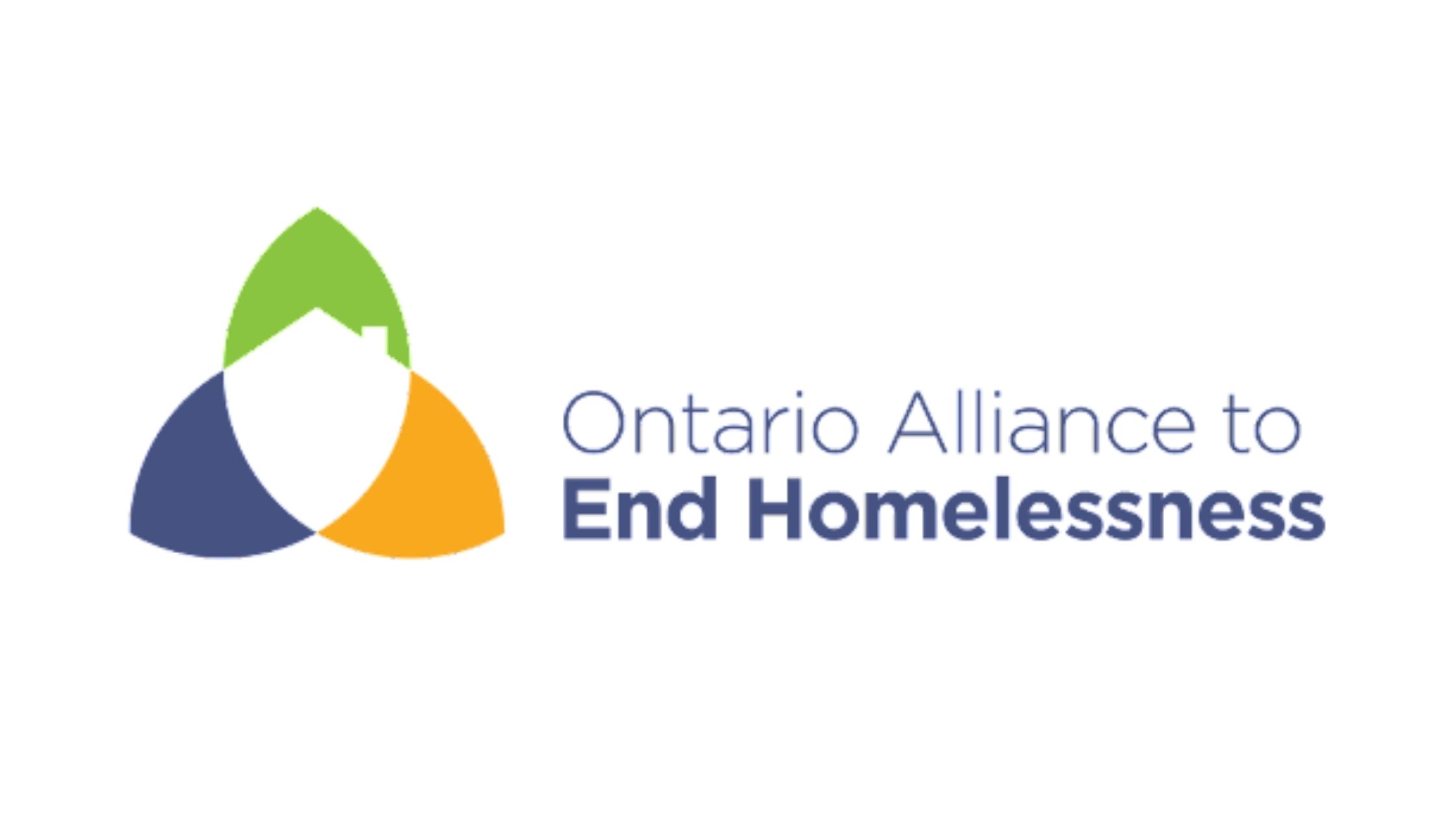
August 30, 2021
RE: Encampments in the City of Hamilton
We, the Ontario Alliance to End Homelessness, have worked together to present to you a path forward to ensure that the actions taken by the City of Hamilton to remove people from encampments end and that the City uphold the encampment protocols created as the result of the Encampment Task Force. Using armed police officers on horseback and in riot gear as we have seen in Toronto, and removing residents who are vulnerable to the unaffordable housing market due to inadequate social supports, has no place in a caring, compassionate society. Instead, we must commit to taking a human rights compliant approach toward housing encampment residents that is co-created with encampment residents.
A tent in a park is no one’s first option, and we understand that parks cannot be a permanent housing solution. However, the forcible removal of encampment residents must end. This inflicts further trauma on already vulnerable Torontonians and does not address the issues you are trying to solve. This approach just relocates people to another park, underneath a bridge, or, worse, back to an unsafe living situation that led them to a tent in the first place. We believe there is a better way. A coalition of poverty and homelessness organizations and advocates, including those with lived experience in encampments and shelters, housing advocates and experts, have worked together to present the following recommendations and we strongly urge the City of Hamilton to uphold its commitment to the protocols in place to address people living in encampments.
A Human Rights Compliant Approach toward Residents in Encampments:
1. Provide safe indoor shelter and housing opportunities for residents of encampments that ensures the safety and dignity of encampment residents and frontline staff. This should be done using a collaborative approach that includes consultation with relevant staff, organizations serving the homeless population and focused on the right to housing and, most importantly, residents with lived experience of homelessness.
2. Ensure that all City directed activity and programs related to encampment abide by the National Protocol for Homeless Encampments in Canada.
3. Recognize that residents are rights-holders who have the ability to make informed decisions regarding their housing/living situation without threat of criminalization, or the use of coercive tactics or force. o This includes an immediate end to the display and use of police force and military tactics, including ‘kettling’, in encampments to intimidate, threaten, coerce, or enforce the displacement of residents.
4. Meaningful engagement with encampment residents and relevant organizations serving unhoused people to assist with navigating options regarding indoor space and housing.
• Residents must be presented with full information regarding indoor space/housing options, and have the ability to choose a space appropriate for them. In order to ensure adequacy, residents should also be allowed to request reasonable changes to indoor space/housing options on offer;
• Residents should not be subject to harassment or intimidation. They should receive appropriate supports until an indoor space/housing option has been freely selected.
5. Uphold the current City’s Protocol that was informed by the UN Special Rapporteur and lawyer Lailani Farha titled “A Human Rights Approach: A National Protocol for Homeless Encampments in Canada”
Providing a Safer and More Welcoming Space for Shelter Residents:
6 . Recognize that shelters, at present, aren’t necessarily a safer option for unhoused the City should:
• Review of existing advisory groups to Shelter, Support, and Housing Administration and establish an advisory committee of current and past shelter clients to provide advice to improve shelter operations for clients;
• Review of existing shelter and respite standards and operational practices to further enhance opportunities to provide a more welcoming environment, including, but not limited to, allowing food in room;
• Review policies that restrict shelter access, including service restrictions, for reasons that are not direct threats to the health and safety of clients or staff, provide support to help clients meet shelter expectations, and ensure that restrictions are reviewed centrally to ensure transparency and accountability;
• Ensure that clients are able to meet with a housing and health care worker within the first week of arrival to understand their needs and develop a housing and health care plan; o Independent audits of shelter operations to ensure the city’s shelter and respite policies are followed and that clients are regularly surveyed regarding their access to housing and health supports, and for feedback upon discharge;
• Ensure that clients are able to sleep and have privacy by reviewing and providing guidance on how to conduct “bed-checks” in a manner that respects client dignity and privacy while ensuring effective shelter operations;
• Provide supports to ensure nutritious meals are available for clients, as per their specific dietary needs and restrictions; and
• Affirm and ensure that the City’s policy to not permit strangers to be placed in a shared room together in shelter hotels and that clients have eligible possessions put in storage is adhered to and communicated to relevant stakeholders.
7. To encourage encampment residents to accept indoor spaces, further enhance the services and supports on-site, including:
• The provision of accessible and low-barrier harm reduction services, including Supervised Consumption Sites and Safe Supply, on location at all shelter sites;
• The provision of accessible, on-site healthcare services in partnership with healthcare agencies at all shelter locations;
• The provision of enhanced and consistent IPAC measures and staff training at all shelter locations;
• Appropriate accommodations for people living with disability specific to their individual health needs;
• More specific spaces and services appropriate to people’s identities, understanding that Indigenous, Black, and trans people are overrepresented among people experiencing homelessness;
• Ensuring the safety and security of people’s belongings, including their tents and sleeping bags.
8. The provision of full information on available shelter sites and greater transparency around the shelter system as a whole, including:
• The provision of location information, location photos, and any other relevant information regarding available shelter space as part of an offer of indoor space, and responding in full to questions and concerns regarding on-site amenities and services at specific shelter locations;
• Public updates around outbreaks of COVID-19, tuberculosis, Group A Streptococcus, and other communicable diseases within the shelter system, with outbreak sites identified by name.
9. Ensuring that shelter capacity does not exceed 90% so that space is readily available for any and all unhoused people seeking a shelter bed, understanding that the shelter system is an emergency service that must be available for anyone that needs it.
Moving Forward — toward permanent housing:
10. Through practice at the City and advocacy to senior levels of government, move away from actions that simply maintain the unaffordable private market, such as rent supplements, or rent banks. These measures should not be a primary component of Toronto’s affordable housing plan and should only be used in emergency situations.
11. Purpose-built, Rent-Geared-to-Income housing should be the City’s primary focus for affordable housing as the majority of people who are, have, or will experience homelessness are simply unable to afford rent, and are not chronically homeless.
12. Supportive housing is an important component, especially for people living with some forms of disability, mental health diagnosis, etc. Supports should be geared toward individual needs.
13. Eviction prevention needs further enhancement — people entering into housing from homelessness should have support to build and maintain an eviction prevention plan for six months to one year; as well, to lessen the number of people experiencing homelessness in Hamilton overall, the City should invest in upstream solutions like housing, but also drop-ins and housing help supports.
Thank you for your attention to this important matter that deeply affects residents of encampments, shelters, and their family and friends across Hamilton that care about their future. We hope you will present and support the above measures at the next meeting of Council and stop dismantling encampments and sit down with community stakeholders to ensure that a Human Rights based approach is upheld when supporting people living in encampments.
Ontario Alliance to End Homelessness (OAEH)
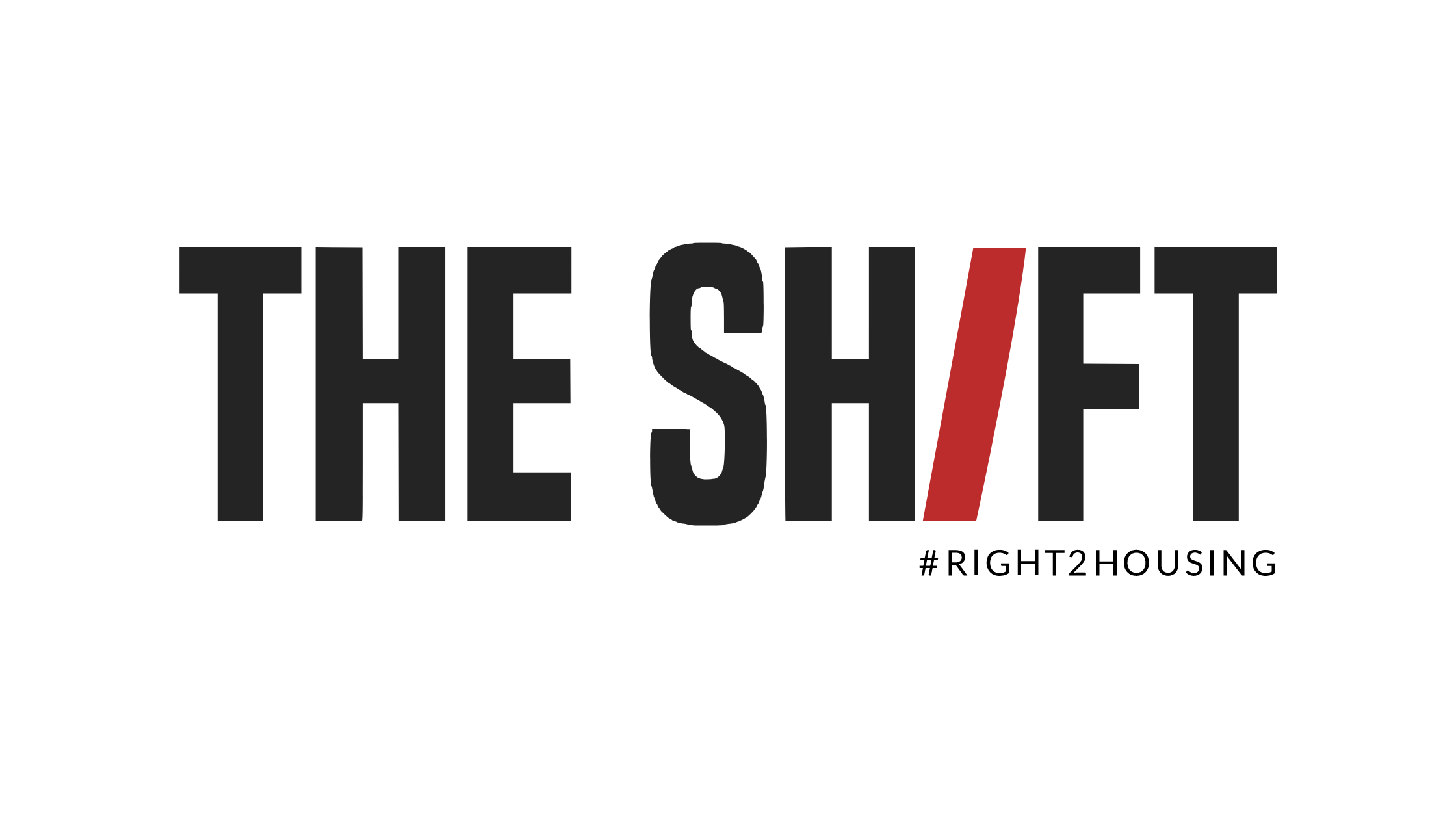
“The Shift is concerned as protections for residents of homeless encampments are rolled back in the
City of Hamilton, threatening the human rights of encampment residents. The City has announced its
intent to revoke its Bylaw Enforcement Protocol relating to homeless encampments as of 30th August
2021, leaving hundreds of people at immediate risk of eviction from their homes within encampments.
This Protocol – arrived at in an agreement between the City and encampment residents, advocates, and
community partners – provided protections against such an eviction, particularly for those with high
acuity needs. Such a revocation, in absence of ensuring access to adequate housing for encampment
residents, is inconsistent with human rights, and will likely result in deepening marginalization, trauma,
health inequities, and safety risks for these community members.”
For the full statement: Shift Statement – Hamilton – Aug 27
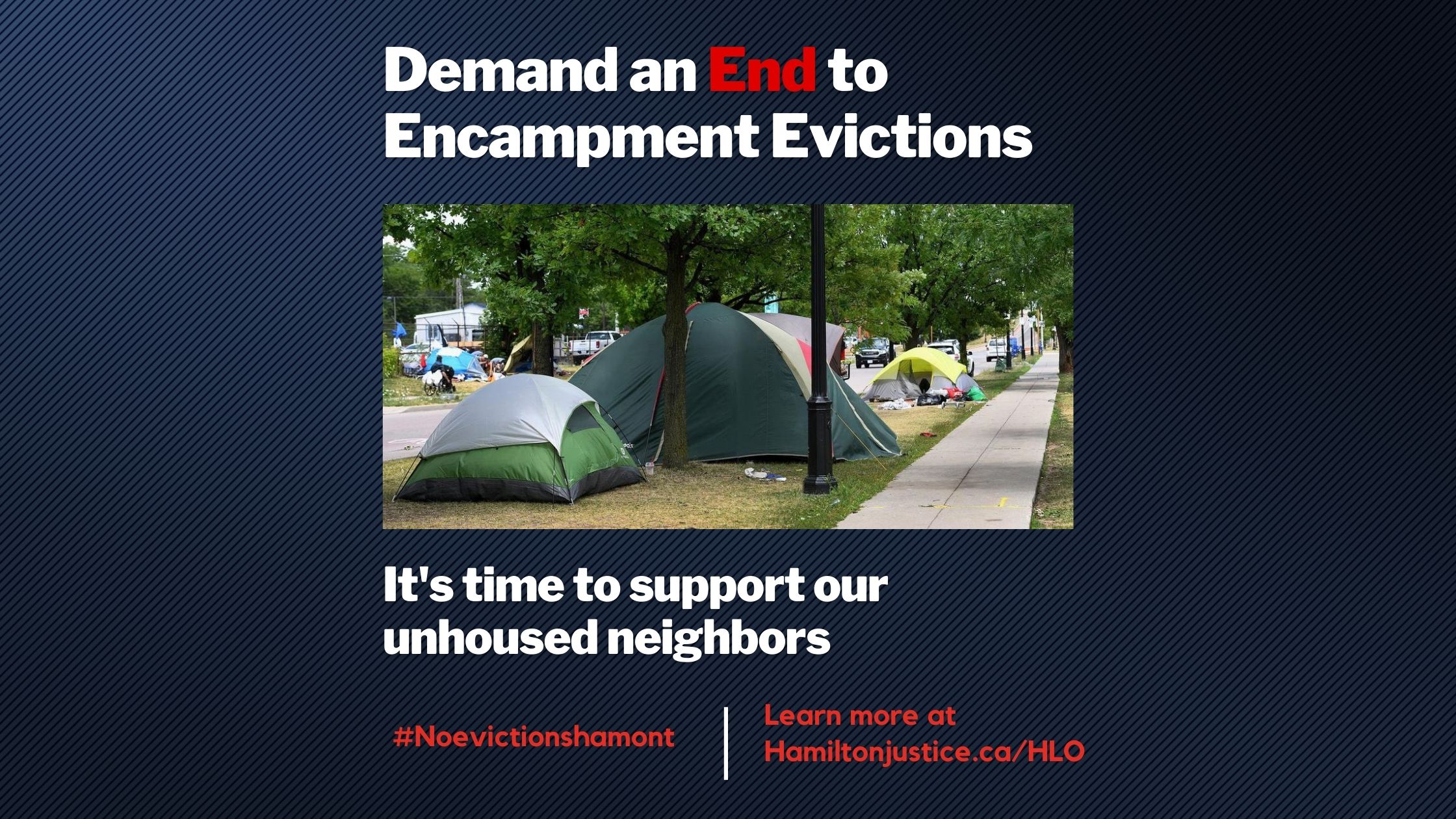
The City of Hamilton’s sudden decision to end the Encampment Protocol is a misguided attack on people who are already struggling to survive without adequate shelter, food, medical care, bathrooms, and potable water and without protection from the elements and threat of violence. The decision was seemingly made without meaningful consultation with encampment residents and community advocates, and fails to recognize the continuing housing and shelter crisis in Hamilton.
In the spring of 2020, Hamilton Community Legal Clinic and Ross & McBride worked with community partners to preserve people’s right to stay in encampments. This was in response to a lack of shelter and affordable permanent housing options, and the health and safety risks associated with ongoing displacement, particularly during a global pandemic. We obtained an injunction to prevent the City from forcing people to leave their tents. The injunction remained in place for approximately two months. Significant objectives were accomplished during this time: outreach agencies were able to facilitate access to healthcare and basic needs and connect individuals with much needed supports, and the risk of Covid infection and transmission was reduced.
In the fall of 2020, a settlement was reached. The settlement created an Encampment Task Force and a people-centred Encampment Protocol. The Protocol was a reasonable middle ground approach which recognized that adequate, secure affordable housing for the population must be an end goal, but forcibly removing people from their encampment without adequate shelter and housing options is harmful. The Protocol itself was informed by “A National Protocol for Homeless Encampments in Canada” authored by the UN Special Rapporteur on the right to adequate housing, Charter protected rights and human rights.
Under the Protocol, the City was required to assess the individual needs of encamped persons, which could result in their ability to remain encamped indefinitely. It also required the City to come up with individualized housing plans, and take a person-centred approach to avoid unnecessary trauma. Hamilton Police Services have been supportive in the application of this Protocol, effectively using it as a means to ensure that individual rights were engaged prior to any enforcement measures were taken by the City.
Despite the Protocol, many encampment residents continue to remain without housing, signalling the root of this problem: a lack of adequate affordable housing, long term health care supports, and safe shelter spaces. None of these fundamental root causes of homelessness are being appropriately addressed, which simply leaves unhoused residents to bear the brunt. City Council’s decision to re-enact By-laws to evict these residents will not lead to a reduction in encampments. At best, it may lead to their reduced visibility as people try to go further off-grid, and deepen the isolation of unhoused persons.
We are mindful of the brutal eviction tactics used by the City of Toronto against encampment residents. We take the position that dismantling and evicting encampment residents is an act of violence. De-escalation and acknowledgment that our community lacks the resources to resolve the encampment concerns should be the starting point for discussion. While we acknowledge that living in encampments is not a long time viable solution, the violent act of evicting and displacing residents without adequate shelter options is a violation of the right to the security of the person, equality rights and the human right to housing.
Our community at large has shown itself to be largely compassionate towards unhoused persons living in tents. The City of Hamilton has a duty to this population, along with other constituents. We call on the City to do the right thing: stop dismantling encampments and sit down with community stakeholders to come up with a new strategy that respects the human rights and dignity of the encampment residents.
We echo The Hamilton Encampment Support Network‘s recent statement and petition to end encampment evictions in the city of Hamilton.
” What’s clear to us is that encampment evictions put people directly in harm’s way and we know that Black and Indigenous community members are overrepresented in encampments. Across Turtle Island, from Tkaronto to the unseeded territories of the xʷməθkʷəy̓əm (Musqueam), səl̓ílwətaʔɬ (Tsleil-Waututh), & Sḵwx̱wú7mesh (Squamish) Nations in so-called Vancouver, it is unjust to violate the dignity and humanity of people in our community.”
For the full statement and petition you can visit here: https://docs.google.com/forms/d/e/1FAIpQLScQoOI5vNUCzCM73F2fJqGbfB4ldMD6nQwiUmSMKabgDckp4Q/viewform
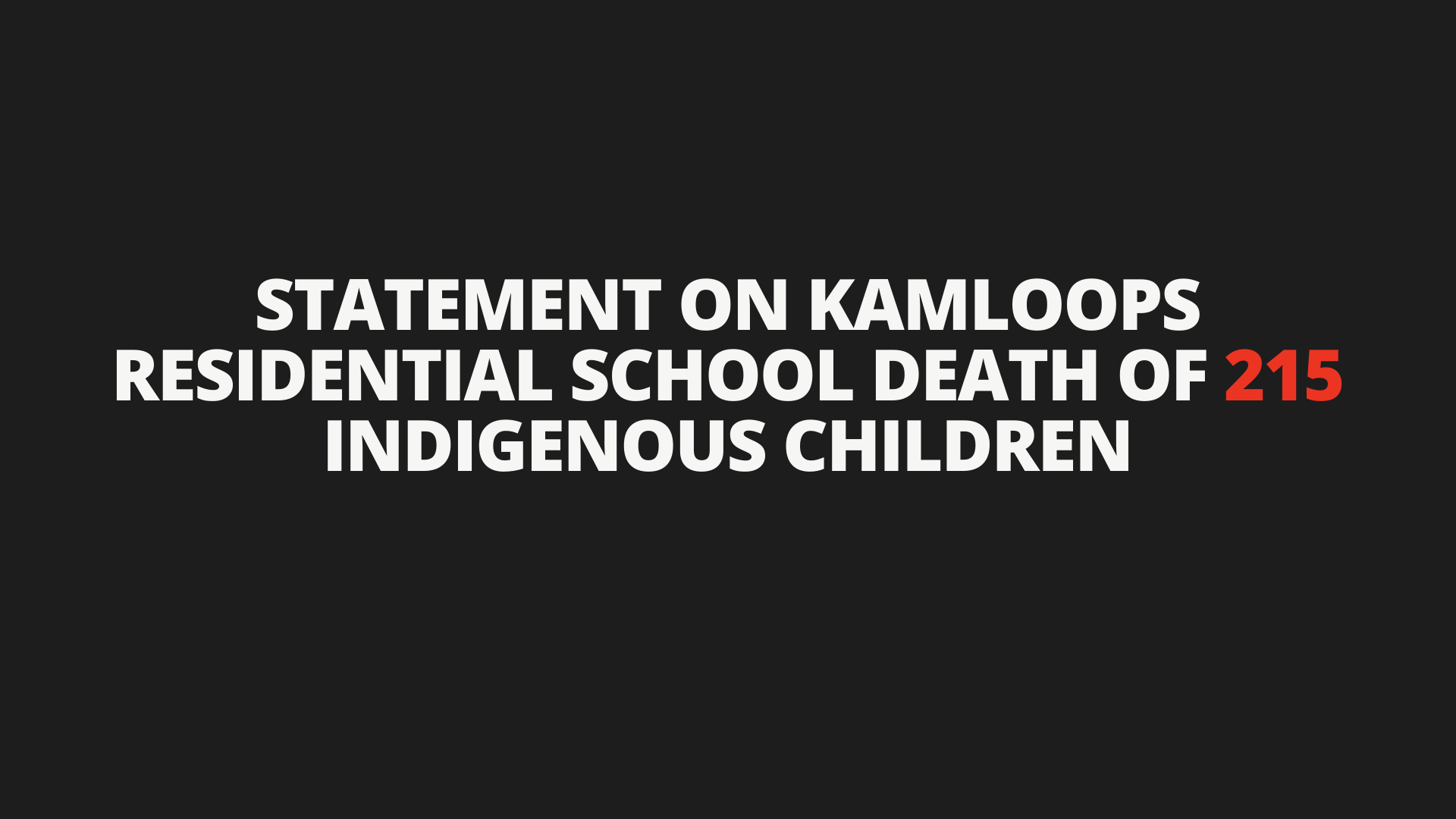
We extend our deepest condolences and stand in solidarity with the families, the Tk’emlúps te Secwépemc First Nation, residential school survivors and Indigenous communities across Canada. This legacy of residential schools haunts all of us in this country and we must stand together to address these wrongs that continue to cause trauma and suffering. We must face this truth in order to begin a reconciliation journey of healing.
We are deeply impacted by the gruesome discovery of the remains of 215 children buried at the site of Kamloops Indian Residential School. We mourn the horrifying loss of 215 children who had been stolen from their families by the State. We are struggling with how to respond to this national tragedy.
As an organization we continue to look at how we can decolonize and be inclusive. In 2017 we completed “A Journey to ReconciliAction: Calls to Action Report” after examining our policies, practices and procedures through the lens of the TRC Report. It is our guide and part of our commitment to First Nations, Inuit and Metis peoples.
We urge all organizations, institutions and governments to implement the Calls to Action as well as the Calls to Justice from the MMIWG Inquiry. We call upon the provincial and federal governments to support the full investigation of all residential school sites for unmarked graves. We call upon the Catholic Church to take responsibility for its role in the operation of schools and the criminal acts that were perpetuated against innocent children in their care.
Locally, we urge you to support the preservation of the “Mush Hole”, the former Mohawk Institute Residential School in Brantford now operated as part of the Woodland Cultural Centre. There has been an attempt by the Canadian Government to destroy all the evidence of Residential Schools. “Save the Evidence” is a campaign to raise awareness and support for the restoration of the former Residential School, and to develop the building into an Interpreted Historic Site and Educational Resource. We have made a contribution and urge you to do the same if able. It is a concrete way to support Indigenous (First Nations, Metis and Inuit) peoples and contribute to both truth and reconciliation.
https://woodlandculturalcentre.ca/the-campaign/